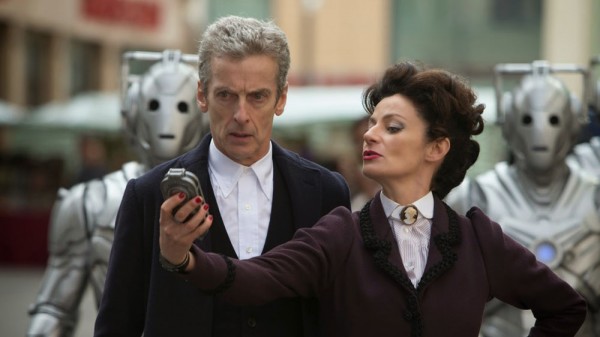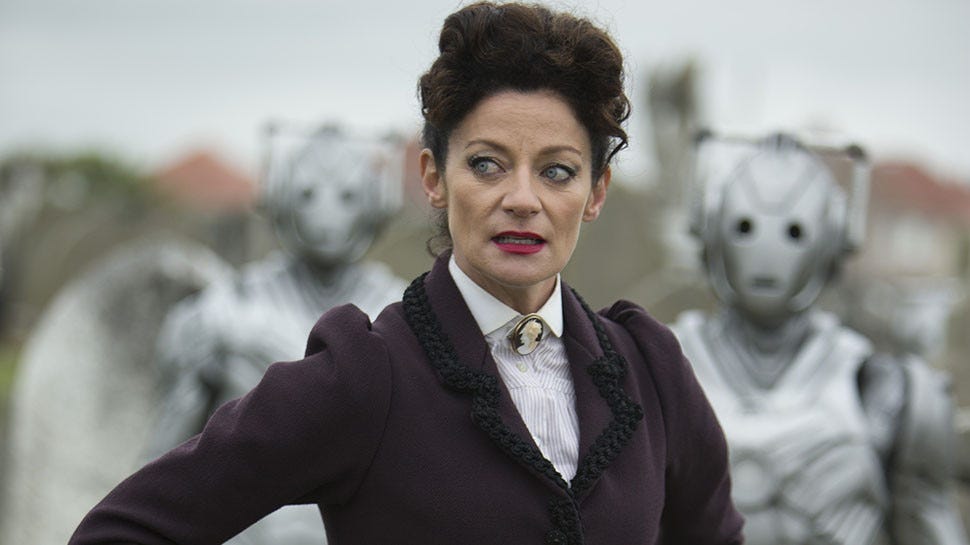REVIEW: Doctor Who, Series 8 Episodes Eleven/Twelve 'Dark Water/Death In Heaven 3D'
REVIEW: Doctor Who, Series 8 Episodes Eleven/Twelve 'Dark Water/Death In Heaven 3D'
In honour of the Doctor Who Series 8 Steelbook releasing today, here are my thoughts on the 3D omnibus edition of Dark Water/Death In Heaven.
During Doctor Who's fifty eight year history, there have been a few stories that have been given the omnibus treatment. Perhaps one of the least well-known is Dark Water/Death In Heaven. The story is largely known as having been shown in two separate parts - but a version which edits both parts together does, in fact, exist. This release was created primarily for American audiences in 2015, and has received no UK release, however the American 3D Blu-ray release is region-free, meaning that the disc can be played by all 3D Blu-ray players, so long as you can get hold of an imported copy.
It is a crying shame that BBC Studios never thought to give this disc a proper UK release, as it is an extremely impressive watch. For a story that was never filmed with 3D in mind, the stereoscopic 3D effects are truly spectacular; the 3D conversion adds extra depth to the picture, and it means you feel as though you could step through the screen and join the Doctor (Peter Capaldi) and Clara (Jenna Coleman) as they investigate the 3W Institute. I'm glad that they opted for this approach, as too often 3D conversions opt for the gimmick of making things pop out of the screen, which can sometimes distract rather than enhance the picture. Playing with depth on the other hand adds more immersion, and considerably enhances the narrative experience.
The story itself is a wonderfully dark and macabre affair. It sees the Doctor and Clara investigating into a company called the 3W institute - run by the mysterious Missy (Michelle Gomez) and Chang (Andrew Leung) - who claim to have discovered the voices of the dead after having heard distant voices during the sound of television static. Meanwhile, Clara's boyfriend Danny Pink (Samuel Anderson) wakes up in the ' Nethersphere', where he is greeted by an AI interface called Seb (Chris Addison), who claims that Danny is in some form of after-life (but really turns out to be a piece of Gallifreyan data-slice from the Matrix). This is a narrative that goes to some very bleak places, including the notion that the dead still feel pain even after they are cremated, and it's no wonder it received so many complaints after transmission. It's a controversial idea for sure which is bound to offend as many people as it entertains, but I love it. There's something quite haunting about the prospect of your dead loved one not finding their inner peace even after they have passed on, and it lingers in the mind long after the story is over.
And then there's the tragedy of poor Danny Pink. There's something undeniably tragic about how his death doesn't come from the hands of a Cyberman or any other monstrous occurrence, but from a situation as everyday and mundane as crossing a road. It feels like a life wasted rather than one coming to an end in a natural or a meaningful way, and it seems so much more cruel as a result. It also helps to demonstrate an act of redemption for Danny in terms of his traumatic past serving in the Armed Forces, when he is given a chance to return, but gives it up in order to save the life of the child he killed by accident in battle. It's such an effective way to showcase how similar Danny and the Doctor are as characters despite their inability to get along; these are both people who stand for what they believe is right, and are prepared to sacrifice their own lives if need be for the good of others in their company.
Talking of similarities with the Doctor, this story also continues the arc of Clara becoming more like the Doctor, which would accelerate into gear further in Series 9. Here, she not only attempts to assert control over the Doctor by throwing the keys to the TARDIS into a burning volcano (which is later revealed to be a dream caused by a sleep patch applied by the Doctor on her neck), but tries to trick the Cybermen into believing she herself is the legendary Time Lord. For a second because of Jenna Coleman's magnificent performance you start to believe that she is indeed 'The Doctor', until it is revealed that Clara was merely bluffing - and it really shows just how strong of an actor she is. She conveys so much authority and presence as Clara Oswald that you could instantly believe that this school teacher from Coal Hill could step into the admittedly big shoes of the Doctor himself.
At the same time you also really feel the pain and hurt of Clara when she demands the Doctor helps her bring Danny back. A man who meant so much to Clara that she will take any means necessary to force her friend from Gallifrey to move heaven and Earth in order to revive him from the dead. The significant loss of somebody who Clara loved so dearly is so very present on Jenna Coleman's face; you really feel that sense of grief that weighs somebody down upon the loss of a loved one, and it's not hard to see why this actor went on to such big things after Doctor Who.
Another impressive element about Dark Water/Death In Heaven is that it's a story that boasts two stunning reveals. The first is that the dead people inside the water tanks of the 3W Institute - the 'dark water' of the title - are actually being converted into Cybermen. It's a really novel piece of visual direction, as the water inside the tanks lower to reveal the Cybermen inside, and showcases the excellent directing capabilities of
Rachel Talalay. Rachel Talalay is easily one of the best directors to ever work on Doctor Who; she has such a unique visual style, and gives a real sense of pace to the episodes of the show that she directs. There's also a very cool nod to Doctor Who's past, in the form of the Cybermen stomping down the steps of St Paul's Cathedral - a direct mirroring of their actions in the 1988 Patrick Troughton serial 'The Invasion'. These kind of visual cues excite me considerably as a fan, as it is always nice to see that those working on the show demonstrate the same love and affection for Doctor Who as I do.
The other is, of course, the excellent reveal that Missy was the Master all along. This reveal, whilst perhaps a tad obvious given that Missy is the female version of 'Master', is brilliantly done, with the same style of witty dialogue we have come to expect from writer Steven Moffat. The way he teases Missy's identity in the line 'Well I couldn't very well call myself the Master, could I?' is the most perfect method of establishing this character's identity to the audience, made all the better by Peter Capaldi's spot-on reaction of shock and disbelief, as he backs away from his old friend in horror. Michelle Gomez is sublime in the role from the start; she commands the screen with her every word, and conveys a real sense of mischief and menace that demonstrates this is not a woman to be messed with. She is, to me, the perfect Master, in that she combines the cold and devious mannerisms of Roger Delgado with the more 'bananas' approach of John Simm. This is a role that they couldn't have cast any better, and I doubt there will ever be a better version of the character.
Alongside the return of the Master are further appearances by Kate Stewart (Jemma Redgrave) and Osgood (Ingrid Oliver), and this is one element that doesn't really interest me. I've never been overly excited by their characters; compared to the UNIT personnel of the classic series they feel rather bland to me. Kate's main personality trait appears to be the connection to her Dad, Brigadier Lethbridge-Stewart, whereas Osgood seems to be defined largely by the fact she is a fan of the Doctor. The latter does get considerably more depth in the Series 9 two parter 'The Zygon Invasion/The Zygon Inversion' - a story which does wonders for her personality - but Kate has yet to truly escape her father's shadow. It's of no fault of the actors, who do well with the material their characters receive, but it does feel as though they could have been much stronger defined in the stories in which they have featured.
The Brigadier himself does show up, in a move that turned out to considerably decisive among the fan base. Here we see the Brigadier's dead body revived in the form of a Cyberman, and I personally don't mind this so much. I think it is quite a sweet and effective tribute to the late Nicholas Courtney, especially as the Cyber-Brig effectively broke his programming to save his daughter from falling to her death, and it means that the Twelfth Doctor technically got an adventure with the Brigadier. What's not to like? Danny Pink gets similar treatment, in that he too defies his Cyber conversion in order to help the Doctor and Clara bring an end to Missy's plans - and it's a neat resolution to the Doctor and Danny's arcs. These two characters began as rivals, and they end by managing to work past their difficulties in order to combine their forces and save the day.
It's not an entirely happy resolution for the Doctor and Clara however - and this is shown through some very neat symbolism of the idea of a 'hug'. Here a hug is demonstrated as the equivalent of masking a lie, the kind of lie where you assure your friend that everything is fine when it's really not. Clara lies that Danny returned from the Nethersphere using the Doctor's device, whereas the Doctor lies that he found Gallifrey via Missy's coordinates. Both cover what their faces are truly saying - the emotion etched across the lines of their facial features - through this method of a hug, and it's a beautifully poignant scene that shows just how protective the Doctor and Clara are over one another's feelings. They each want the other to believe that they are happy, because they don't want them to worry as they (temporarily) go their separate ways. The Doctor doesn't want to spoil Clara's domestic bliss, whilst Clara doesn't want to spoil the Doctor's 'triumphant return' to his home planet. As the Doctor says, 'Never trust a hug. It's just another way of hiding your face'.
Overall, 'Dark Water/Death In Heaven' is an amazing finale to Peter Capaldi's first series as the Doctor. Featuring shocking twists, impeccable performances by the main cast and superb direction by Rachel Talalay, this is a story that will be remembered for the strong themes and ideals it represents. The 3D conversion is also spot-on, and proves how much Doctor Who is a perfect fit for this viewing experience. This is a story that you must absolutely experience in stereoscopic 3D; after all, how can you say 'No' to being immersed into the Doctor's adventures like never before (Well, until 'The Edge of Time', that is)?
To have future posts delivered direct to your inbox, click the three lines at the top and register for email notifications via the 'Follow by Email' box.
What are your thoughts on Dark Water/Death In Heaven 3D? Let me know in the comments section.



Comments
Post a Comment